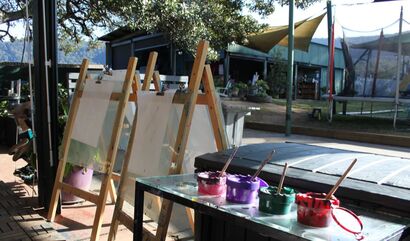Transition to school
|
Educational Program Upon enrolment each child is allocated a focus teacher who is responsible for the planning, documenting and evaluating the ongoing assessment of learning for each child. Whilst all educators at the service have input into every child's learning, focus educators are responsible for monitoring individual children’s development and are the focal point for parents questioning and concerns about children’s development. Observations are recorded on each child and programming, planning and the learning environments, support all aspects of children's learning. All planning for the educational program and practices focus on reaching the learning outcomes set out in the national, The Early Years Learning Framework (EYLF). The EYLF places specific emphasis on play based learning and recognises the importance of communication, language, social and emotional development. It aims to provide the children with opportunities to maximise their potential and develop a foundation for future success in learning. This short video is an adaptation of a traditional fable.
It reminds us that it is important to remember that each child has their own unique gifts and challenges. |
Is my ready child for school? A topic that tends to receive a lot of attention and debate each year is school readiness and the appropriate age for transitioning to formal schooling. Parents each year have many anxieties and questions regarding children’s transitions onto kindergarten. To clarify for families, children in NSW are required to start Kindergarten by their 6th birthday (in the year they turn 6). If families are considering sending their child earlier than this, (Birthdays Jan-July) the decision needs to be thought through thoroughly. Each child is an individual and this decision should be made considering the individual child and their strengths, interests and needs. If you are considering sending your child before the year they turn 6 you are welcome to discuss the pros and cons with your child’s focus educator. Preparing children for school involves a whole series of developments, each taking place at different rates for all children. Five dimensions of a child’s readiness have been identified as: physical wellbeing and motor development, social and emotional development, approaches to learning, language development and cognition and general knowledge. Over the years there seems to be a trend to associate the intellectual area of development as being the most important area to be proficient in to be ready for school. While this is important, it is just one area of your child’s total development. Others such as physical, social, emotional, and communicative domains are just as important for learning, growth and development. “A child who is ready to start school because he or she has good social skills and is a confident learner will have foundations set for a lifetime of learning” – Illawarra Christian School One of the areas of development that is crucially important for school is the area of social and emotional development. If a child is socially and emotionally mature and competent, they are usually far better equipped to adjust to the change. For example, if children can separate from their parents with little distress, if they are able to manage their emotions in a productive manner, are able to play co-operatively with their peers, are able to are able to follow instructions, and sit still and attend at a group-time, know when they can have a turn of talking, and can toilet themselves virtually independently, they are at a distinct advantage. Children who experience academic and social difficulties in the early school years are likely to continue having problems throughout their school careers, and indeed, throughout their adult life. Over my years of teaching I have had many discussions with principals, kindergarten teachers and parents on children’s successful or unsuccessful transition to school. No parent has ever said, “ I wish I had of sent them early”, but parents have expresses their disappointment in their choice to not give their child an extra year to prepare. The question many kindergarten teachers ask is, “Do you want them to survive or thrive?” Being ready for school and having positive experiences in the early years of school will enable your child to not only cope with school, but to thrive and develop to their full potential. If in doubt...keep them out If you are uncertain about your child's readiness for school it is best to give them an extra year in a play based learning environment. This will enable them to reach their fullest potential and develop their self-confidence and self-esteem so that they may thrive and set the foundations for a successful educational career. |

